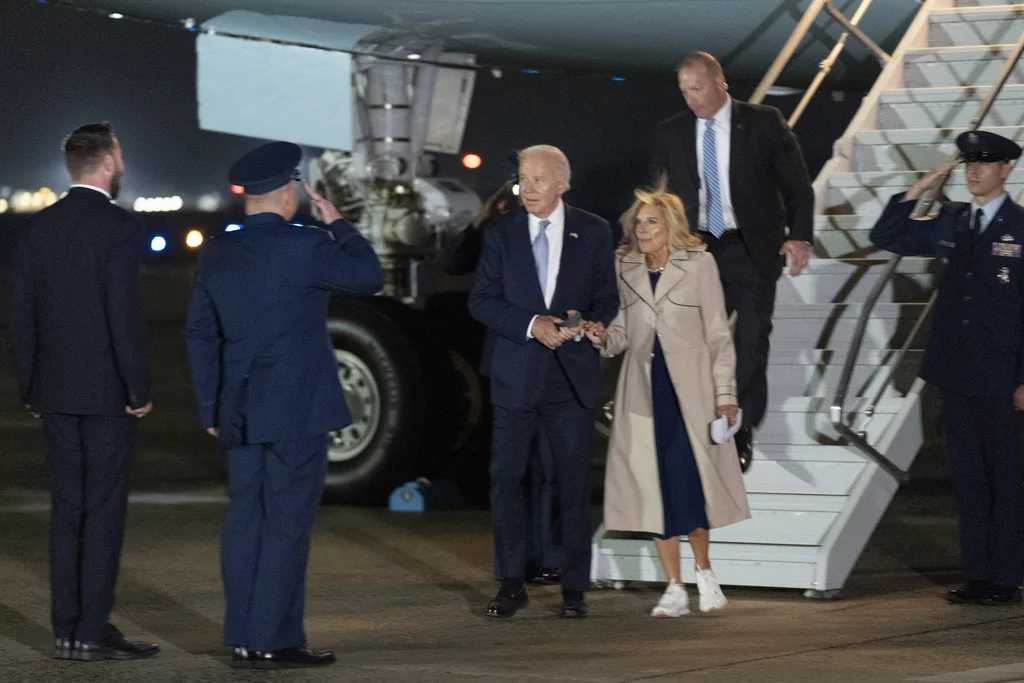

The Israel-Hamas conflict is threatening to spill into a “full-out war” in the Middle East, with both President Joe Biden and the U.S. Congress preparing to depart Washington, D.C.
Biden has consistently worked to broker a ceasefire deal between Israel and Hamas, yet the Israel Defense Forces’ latest campaign targeting Hezbollah in Lebanon appears to undermine that process. It looks increasingly likely that the president won’t achieve a ceasefire deal before leaving office in January, saddling either Vice President Kamala Harris or former President Donald Trump with overseeing the next phase of the Middle East conflict.
Biden addressed Israel’s offensives against Hamas and Hezbollah during his speech before the United Nations General Assembly earlier this week, though much of his speech touted his handling of the conflict in the Middle East and the war in Ukraine.
“There will always be forces that pull our countries apart and the world apart. Aggression, extremism, chaos, and cynicism. A desire to retreat from the world and go it alone. Our task, our task, is to make sure that the forces holding us together are stronger than those that are pulling us apart,” the president said. “My fellow leaders, I truly believe we’re at another inflection point in world history. That the choices we make today will determine our future for decades to come.”
Still, Biden stood firm on his support for Israel and the country’s “right and responsibility” to prevent attacks like Oct. 7 from happening while simultaneously attempting to de-escalate the situation.
“Full-scale war is not in anyone’s interest,” he said. “Even as the situation has escalated, a diplomatic solution is still possible.”
Meanwhile, Congress gaveled out of session Wednesday evening for the next seven weeks and won’t return until after the election. Lawmakers on the Senate Foreign Relations Committee said that physically not being in Washington would not hinder them from being able to monitor the situation but expressed serious concerns to the Washington Examiner that the fighting could soon engulf the full region.
“I think we will be briefed remotely,” Sen. Jeanne Shaheen (D-NH) said, speaking to the Washington Examiner. “Everyone who is on the Foreign Relations Committee and everyone really in Congress is watching with great concern about what’s happening in the Middle East, the expansion of the potential war into Lebanon.”
Sen. Pete Ricketts (R-NE) said the most crucial part of their work will be monitoring how the Biden administration responds.
“We will continue to monitor what the executive branch is doing, and even though we are not in D.C., we still have the opportunity to talk to the press and get the word out,” Ricketts said.
.@SenatorRisch tells me he doesn’t believe the Israel-Hamas conflict will spill into a wider war with latest escalation with Hezbollah: “If you’re concerned about that, tell me who’s going to join in who is not already in? What you have is a war that’s being conducted by Iran.” pic.twitter.com/9SR1xN7iDG
— Samantha-Jo Roth (@SamanthaJoRoth) September 26, 2024
Sen. Jim Risch (R-ID), the ranking member of the Senate Foreign Relations Committee, said the panel functions well even when the majority of members are remote. However, the Idaho senator does not believe this conflict between Israel and Hezbollah in Lebanon will result in a wider spread of war in the region.
“If you’re concerned about that, tell me who’s going to join in who is not already in,” Risch questioned. “What you have right now is you have Iran. You have a war that is being conducted by Iran. You’ll say to me, ‘What about Hamas? What about Hezbollah? What about the Houthis?’ They are all Iran. They are trained by Iran.”
Risch pointed out that when Iran launched a barrage of drones and missiles against Israel this spring, it ran into interference from a couple of unlikely sources — Jordan and Saudi Arabia, which helped thwart the attack.
“That indicates what the state of play is there — so, am I concerned about this expanding into war with more countries? No, I am not. There’s already a war going on. It is a full-blown war between Israel and the proxies of Iran,” Risch said.
Senate Minority Leader Mitch McConnell (R-KY) and Sen. Tom Cotton (R-AR) sent a letter to the White House on Wednesday with concern that the Biden administration is delaying the delivery of three critical types of military weapons and equipment to Israel. The Biden administration is withholding MK-84 bombs, Apache attack helicopters, and Caterpillar DP tractors, according to Cotton and McConnell.
“Further delays will endanger Israeli lives, increase the likelihood that the conflict will escalate further, and harm American national security interests. It’s far past time to transfer to Israel the capabilities it needs to win,” the senators wrote.
Risch also urged the Biden administration to act “quicker and more broadly” when it comes to transferring weapons to Israel.
“I’m less than satisfied with the performance, but what is happening is happening. At least they’re getting some of the stuff that they need,” Risch said.
Sen. Tim Kaine (D-VA), another member of the Senate Foreign Relations Committee, said it is critical to do everything possible to ensure the United States is not directly involved in another war abroad.
“We need to stay out. If we are sending troops there to be a deterrent, like the carrier groups, they can be a deterrent, and they can also be a source to evacuate Americans from Lebanon, that’s good, but we do not need to be close to being drawn into a battle that is not ours,” Kaine said, speaking to the Washington Examiner.
“I’m getting briefed all the time, and I know what I think, which is, it would be folly and it would demonstrate a lack of learning from years 2001 to 2021 if the U.S. were to be in another war in the region,” he added.
CLICK HERE TO READ MORE FROM THE WASHINGTON EXAMINER
Members of Congress said they would continue to be on high alert over the next couple of weeks. With the fighting between Israel and Hezbollah threatening to become a wider war, Sen. Richard Blumenthal (D-CT) is hoping the situation won’t escalate into an October surprise this election cycle.
“The Middle East is always unpredictable. I hope it’s unpredictable in a good way,” Blumenthal said.



